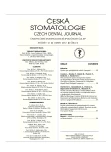-
Medical journals
- Career
Miniimplant Supported Full Dentures. Two-years Study.
Authors: P. Barták 1,2; R. Šmucler 1,2
Authors‘ workplace: Klinika a institut estetické medicíny Asklepion, Praha 1; Stomatologická klinika 1. LFUK a VFN, Praha 2
Published in: Česká stomatologie / Praktické zubní lékařství, ročník 112, 2012, 2, s. 57-63
Category: Clinical Prospective Study
Overview
Aim of study:
The authors of this paper studied possibility of increase of total removable dentures retention using intraosseous implants of small diameter (hereinafter mini dental implants). The study conducted by four dentists under the same conditions (due to reduction of interpersonal differences) investigated survival of immediately functioning implants for two years.Results:
From June 2003 to January 2010, four dentists treated 80 patients with total removable denture fixed by mini dental implants; all these patients met study criteria. This was a group of patients in which many of them were medically compromised (patients with cancer and patients with uncontrolled diabetes). Ninety-nine mini dental implants were installed to maxilla and 236 mini dental implants were installed to mandible. In total, 335 mini dental implants were installed. In average, 3.72 mini dental implants were installed to each patient. The patients were regularly followed-up and final evaluation was performed after 24 months of follow-up. In the follow-up period, 29 (8.66%) mini dental implants failed in 10 patients. In total, 306 mini dental implants were fully functioning. Total treatment had to be reinitiated or another method (“standard” implants) had to be used in three patients, i.e. treatment failed in 3.75% of patients.Conclusion:
Treatment with total removable denture with retention using mini dental implants could be considered long-term provisional solution with high rate of outcome predictability. This procedure can be an alternative to installation of implants with standard diameter. Comparison with trial investigating standard implants is difficult; however standard implants have higher success rate and indication to use mini dental implants is reasonable in patients in whose standard implants are contraindicated (anatomical conditions and impossible augmentation, medically compromised patients, limited time and financial possibilities etc.).Key words:
mini dental implant – dental implant – removable denture – medically compromised patient
Sources
1. Akeel, R.: Effect of the Quality of Removable Prostheses on Patient Satisfaction. Journal of Contemporary Dental Practice, roč. 10, 2009, č. 6, s. 1–9.
2. Grossmann, Y., Levin L., Sadan A.: A retrospective case series of implants used to restore partially edentulous patients with implant-supported removable partial dentures: 31-month mean follow-up results. Quintessence Int., roč. 39, 2008, č. 8, s. 665–671.
3. Irish, J. D.: A 5 500 year old artificial human tooth from Egypt: A historical note. Int. J. Oral. Maxillofac. Implants, roč. 19, 2004, č. 5, s. 645–647.
4. Jablonski, D.: The comparison of usefulness prosthetic rehabilitation with removable and fixed suprastructures on endosseous implants. Ann. Acad. Med. Stetin., roč. 50, 2004, č. 1, s. 123–129.
5. Rosenlicht, J. L.: History of immediate load in implant dentistry. Interview Dent. Implantol. Update, roč. 15, 2004, č.10, s. 73–79.
6. Schwartz-Arad, D., Kidron, N., Dolev, E.: A long-term study of implants supporting overdentures as a model for implant success. Journal of Periodontology, roč. 76, 2005, č. 9, s. 1431–1435.
7. Sendax, V. I.: Mini-implants as adjuncts for transitional prostheses. Dent. Implantol. Update, roč. 7, 1996, č. 2, s. 12–15.
8. Shatkin, T. E., et al.: Mini dental implants for long-term fixed and removable prosthetics: A retrospective analysis of 2514 implants placed over a five-year period. Compend. Contin. Educ. Dent., roč. 28, 2007, č. 2, s. 92–99.
9. Šmucler, R., Barták, P.: Deset úhlů pohledů na výhody a nevýhody zubních miniimplantátů. Čes. Stom., roč. 112, 2012, č. 1, s. 23.
10. Turkyilmaz, I., Company, A. M., McGlumphy, E. A.: Should edentulous patients be constrained to removable complete dentures? The use of dental implants to improve the quality of life for edentulous patients. Gerodontology, roč. 27, 2010, č.1, s. 3–10.
11. Weinländer, M., Piehslinger, E., Krennmair, G.: Removable implant-prosthodontic rehabilitation of the edentulous mandible: five-year results of different prosthetic anchorage concepts. International Journal of Oral and Maxillofacial Implants, roč. 25, 2010, č. 3, s. 589–597.
Labels
Maxillofacial surgery Orthodontics Dental medicine
Article was published inCzech Dental Journal

2012 Issue 2-
All articles in this issue
- Effect of Macleaya Cordata (Willd )R.Br. Extract on Expression of Inflammatory Markers and Oxidative Stress in Gingival Fibroblasts
- The Effect of Surface Treatment on Composite Repair Bond Strength Longevity
- Miniimplant Supported Full Dentures. Two-years Study.
- Oral Squamous Cell Carcinoma in the Annals of the Department of Dentistry in Hradec Králové
- Alveolar Bone Formation by Orthodontic Movement
- Czech Dental Journal
- Journal archive
- Current issue
- Online only
- About the journal
Most read in this issue- Alveolar Bone Formation by Orthodontic Movement
- Oral Squamous Cell Carcinoma in the Annals of the Department of Dentistry in Hradec Králové
- The Effect of Surface Treatment on Composite Repair Bond Strength Longevity
- Effect of Macleaya Cordata (Willd )R.Br. Extract on Expression of Inflammatory Markers and Oxidative Stress in Gingival Fibroblasts
Login#ADS_BOTTOM_SCRIPTS#Forgotten passwordEnter the email address that you registered with. We will send you instructions on how to set a new password.
- Career

